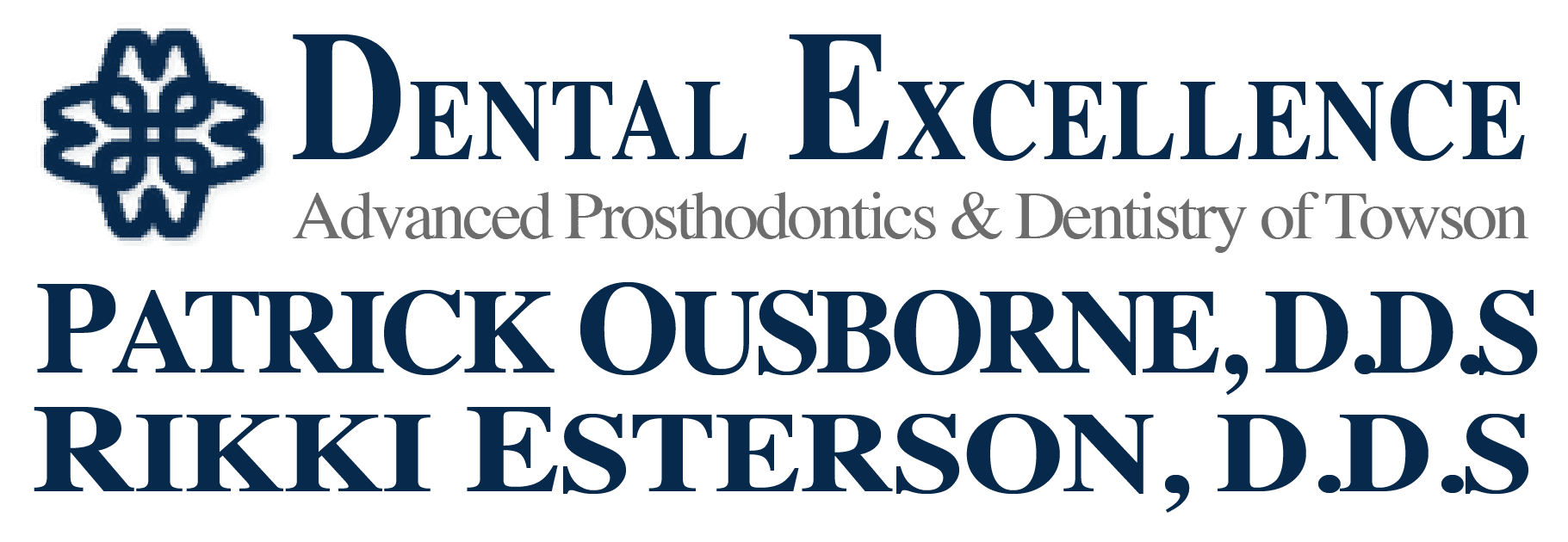Your dental health and your overall health are directly intertwined. Because your mouth is the main entry point to the rest of your body, ensuring that your dentition is healthy and strong goes a long way in maintaining your overall health. To help our patients maintain their best dental health, we offer a wide range of general dentistry solutions.
At Dental Excellence in Towson, we are here for you, no matter your dental concerns. Dr. Ousborne and Dr. Esterson encourage you to visit our office once every six months for routine oral health and wellness visits. This allows us to closely monitor your dental structures and address minor issues before they develop into major dental concerns.

Maintaining Your Smile
Dental Cleanings and Disease Prevention
A dental cleaning is a professional teeth cleaning performed by a highly trained oral hygienist. They use special tools to remove plaque, tartar, and stains that accumulate on teeth. After this, your hygienist will polish your teeth to remove stains and smooth the tooth surface. Regular professional teeth cleanings prevent dental diseases including gum disease. They remove plaque and tartar which are filled with bacteria that contribute to tooth decay, gum disease, and other oral health issues. To learn more about the importance of teeth cleanings, see Dental Cleanings and Disease Prevention.
Tooth-Colored Fillings
A dental filling is a common treatment we use to address tooth decay and other oral health issues. Our office Dr. Ousborne and Dr. Esterson prefer to use tooth-colored fillings made from composite resin or porcelain. Unlike traditional silver fillings, composite dental fillings closely match the natural color of your teeth. This will make the tooth being treated more aesthetically pleasing and allow it to blend in with the rest of the surrounding teeth. A tooth-colored filling will bond directly to the tooth and requires tooth removal than amalgam fillings. To learn more about the benefits of composite fillings, see Tooth Colored Fillings.
Emergency Dentistry
Dental emergencies are any unexpected, sudden pain or discomfort from your dental structures. Knocked-out teeth, impacted teeth, or throbbing toothaches are all common dental emergencies that we treat in our office. We encourage you to contact our office directly if you are experiencing a dental emergency. Our dental care team will prioritize your care and ensure Dr. Ousborne and Dr. Esterson sees you in a timely manner. To learn more about what to do in a dental emergency, see Emergency Dentistry.
Family Dentistry
Our office treats patients of all ages with our family dentistry services. We are prepared to offer convenient and compassionate care to children and adults. We understand that sometimes parents and children will want to be seen at the same time to minimize the time spent in the dental office. Our staff will do the best we can to accommodate these requests. Everyone on our team looks forward to the opportunity to help you and your child achieve lifelong dental health. To learn more about the benefits of choosing a family dentist, see Family Dentistry.
Sedation Dentistry
Our office understands that sitting in the dental chair can be an anxiety-provoking experience for some patients. Many patients visit our office after having negative dental care experiences elsewhere. Additionally, some patients may have general anxieties about being in an unfamiliar environment surrounded by equipment noises while undergoing dental procedures. We offer sedation dentistry solutions to ensure even our most anxious patients enjoy a comfortable dentistry experience. To learn more about the types of dental sedation we offer, see Sedation Dentistry.
Tooth Extraction
Sometimes, removing a problematic tooth is necessary for the betterment of your overall dental health. In our Towson, MD dentist office, we provide safe tooth extraction services. Whether you need to have a wisdom tooth removed, an impacted tooth removed, or a severely decayed tooth removed, we can accommodate your extraction needs and get you back on track to your optimal dental health. To learn more about the extraction procedure, see Tooth Extraction.
Nightguards
Nightguards help our patients address a variety of dental concerns. Most commonly, we recommend them to patients who suffer from teeth grinding or TMJ disorders. Nightguards hold your jaw in a healthy resting position as you sleep while also protecting your dental structures from sustaining unintended pressure throughout the night. They allow patients to protect their dental structures and wake up with a fully rested jaw. To learn more about the benefits of wearing a nightguard, see Nightguards.
General Dentistry FAQs
Learn more about our general dentistry services by reading answers to frequently asked questions we get asked. We offer a wide range of services aimed at maintaining your oral health. If you are curious about dental fillings, extractions, or emergency dental care, start here to see if you can find the answer to your question. Give us a call if have additional questions or concerns about general dental care.
Do dentists and other medical professionals consider extreme tooth pain an emergency?
A toothache is a sign something is wrong with your teeth or gums. Patients should seek emergency treatment when they experience knocked out, chipped, or loose teeth. However, if you are experiencing a severe toothache, especially accompanied by broken tooth structure or any infection of the gums (an abscess), you should visit the ER immediately.
How often should I visit my family dentist every year?
According to the American Dental Association, you should visit your dentist at least twice a year, with six months between visits. However, experts believe that people without dental problems may visit the dentist only once a year. However, patients with extensive dental issues like tooth decay and gum disease should visit their dentist as frequently as three to four months.
What procedures will require my dentist to use Sedation Dentistry?
Minor dental and oral surgeries will usually involve sedation dentistry.
This can range from routine restorative procedures like root canal therapy to invasive procedures like tooth extraction or dental implant placement. Your dentist will also use sedation dentistry for less invasive treatments like fillings, scaling, and cosmetic procedures. The dentist will use sedation when the patient suffers from dental anxiety or is uncomfortable with dental procedures.
How long does it take to recover from a tooth extraction?
Healing periods for tooth extraction can vary from patient to patient. You are likely to recuperate only a few hours after a simple extraction. However, if you have undergone a surgical extraction, you may look for 48 to 72 hours for the surgical site to form a clot. Your dentist may prescribe you a painkiller or recommend an over-the-counter pain reliever to soothe the tenderness. It should take one to two weeks for your tooth extraction area to heal completely.
What is the difference between a mouthguard and a night guard?
A night guard is a mouthpiece with thermoplastic material that fits snugly over your teeth. The dentist will prescribe for night guard people who are habitual teeth grinders, especially during sleep. This thick plastic protects their teeth from rubbing against each other while sleeping. A mouth guard is a device with similar material to the night guard, but athletes use it to protect their teeth from accidents during a game, particularly in contact sports.
How long does it take to receive dental fillings?
The time it takes to receive dental fillings depends on the complexity of the filling and if your dentist needs preparation. Generally, a simple filling can take 30 minutes to an hour, while a more complex filling may take up to two hours or more. If the dentist needs to remove tooth decay before placing the filling, this will add additional time. The dentist will also need extra time for shaping and polishing the tooth after placing the restoration material. Therefore, it is best to plan for at least one hour for a dental filling appointment.
